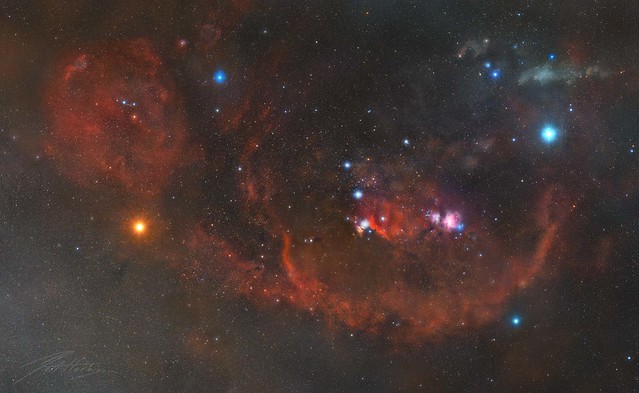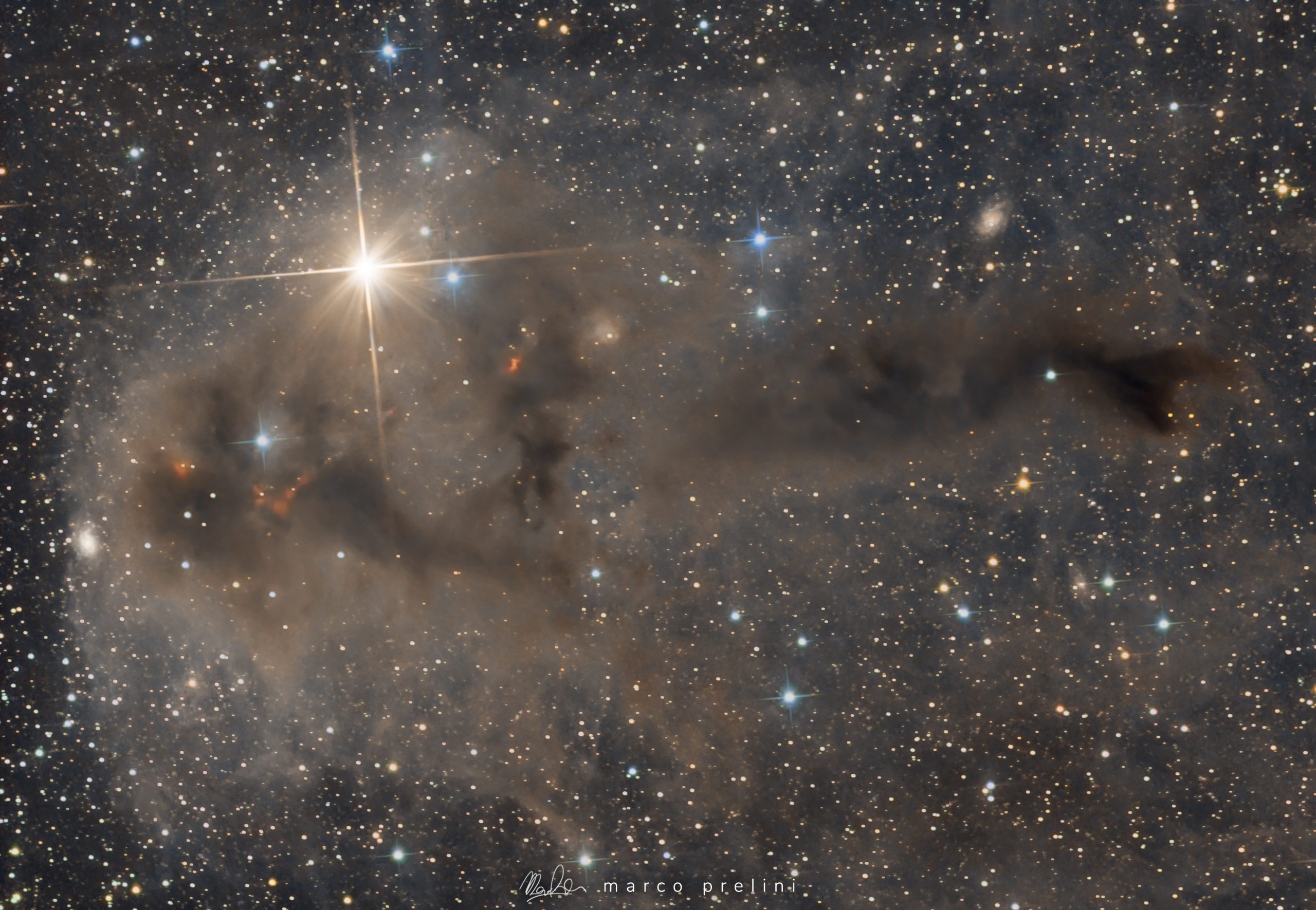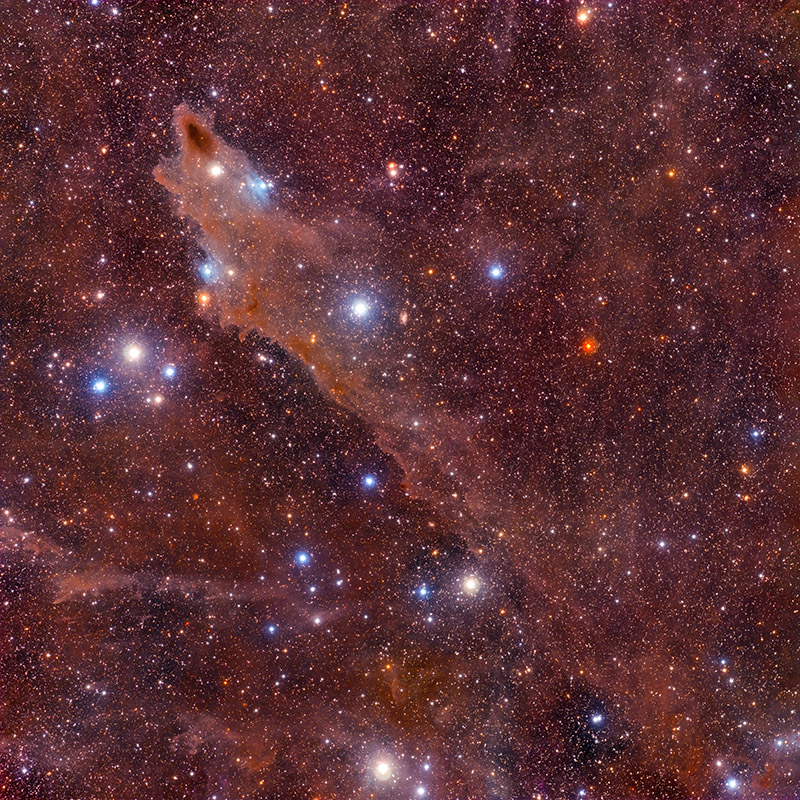Page 5 of 6
SH2-155 Cave Nebula
Posted: Fri Sep 25, 2020 8:20 pm
by cfm2004
October 2019/July 2020
Location: San Romualdo - Ravenna (Italy)
Tecnosky AG 70/350
ASA DDM60PRO - Unguided images
CCD QSI 583ws cooled -15
Astrodon RGB Gen2 E-series and Narrowband 3nm filters
HA-RGB: HA 24x15min, R 29x5min, G 29x5min, B 42x5min.
Acquired with: MaximDL5 - Calibrated with Dark, Bias and Flat
Processed with: MaximDL5, Astroart6, Paint Shop Pro2020, plug-in Topaz and Nik
Cristina Cellini
Re: Submissions: 2020 September
Posted: Sat Sep 26, 2020 3:27 pm
by PierandreaFolle
Hypnotic
Startrail of 420 images of 45 seconds each, during a night spent on top of Serra di Crispo peak, in Pollino National Park.
Copyright: Pierandrea Folle
HQ
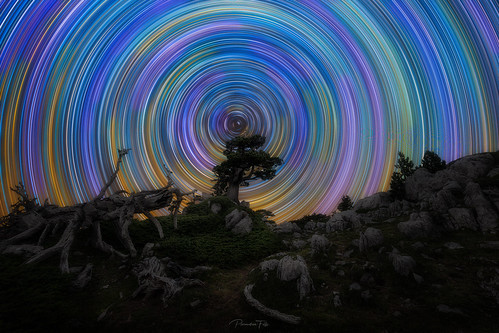 Hypnotic
Hypnotic by
Pierandrea Folle, su Flickr
Re: Submissions: 2020 September
Posted: Sat Sep 26, 2020 3:49 pm
by Gianluca_Rossi
Re: Submissions: 2020 September
Posted: Sat Sep 26, 2020 4:51 pm
by brent1123
Sh2-73 / Sharpless 73 in LRGB
astronewton.com/astrophotography
Copyright: Brent Newton
30 hours exposure evenly divided between 310x180" L, 69x240" ea/RGB
Shot in Spring 2020 using an ASI1600MM-P and a William Optics Star71-II APO
For any fans of Star Trek DS9, I've taken to calling it the Chel Grett nebula since it seems to resemble a Breen warship
Re: Submissions: 2020 September
Posted: Sun Sep 27, 2020 3:51 am
by Ann
JSythes wrote: ↑Sat Sep 19, 2020 12:37 am
Milky Way core setting over Purbeck Radar Memorial
Taken on 16th of September at St Aldhelm's Head, Jurassic Coast, Dorset, United Kingdom.
The memorial commemorates the radar research carried out at Worth Matravers, during the second world war from 1940-1942 which was crucial to the birth of modern telecommunications.
More information on the Early Radar development at Worth Matravers can be found here:
http://www.purbeckradar.org.uk/index.html
Equipment, Exposure and Processing
Cannon EOS RA, Samyang 14mm F2.8 - 4x 120 seconds tracked sky, 2x 120 seconds foreground - single composition. Stacked in Sequator and edited in Lightroom.
I've submitted two versions - a colour one and also a desaturated one which I feel fits the story of the research better.

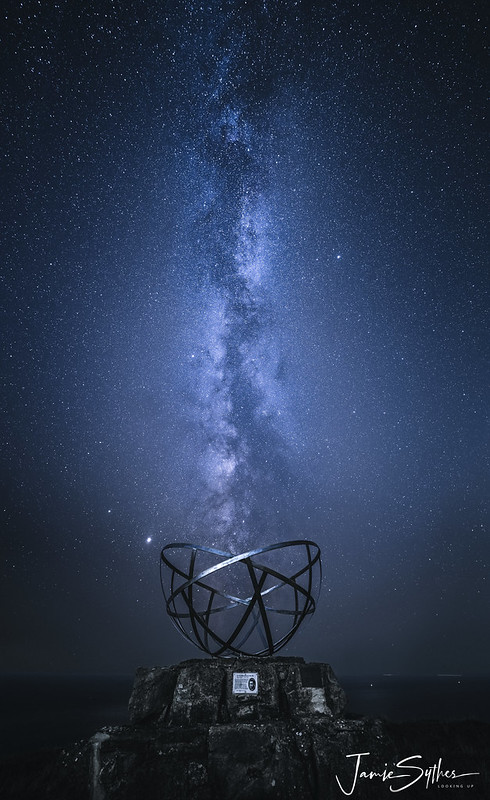
Thanks, I really like both of them!

Ann
Re: Submissions: 2020 September
Posted: Sun Sep 27, 2020 3:53 am
by Ann
AstroGabe wrote: ↑Mon Sep 14, 2020 3:53 am
The Soap Bubble Nebula
Details:
Scope: ONTC1010 f/4 reflector
Coma corrector: Paracorr Type 2
Camera: QSI690-wsg8
Guide Camera: SX Ultrastar
Mount: AP1100
Ha: 14x15min
OIII: 19x15min
Total exposure: 8.2 hours
Software: Voyager, PHD2, APCC, Pixinsight
Astrobin for more details:
https://www.astrobin.com/04wn5n/
Acquisition and processing:
Gabe Shaughnessy
June-July 2020
SKmC4GjdEA95_620x0_LeGaXsse[1].png
https://cdn.astrobin.com/thumbs/SKmC4Gj ... GaXsse.png
Well done capturing this ethereally faint and very difficult object!
Ann
Re: On a plot of Cassiopea
Posted: Sun Sep 27, 2020 4:12 am
by Ann
I just spent a lot of time identifying all the bright stars and nebulas in this fabulous picture! Thank you!

Ann
Re: Submissions: 2020 September
Posted: Sun Sep 27, 2020 5:06 am
by Ann
KuriousGeorge wrote: ↑Mon Sep 21, 2020 11:20 pm
Starburst Galaxy IC10.
KG Observatory, Julian, CA
My second project with the new ZWO ASI6200M Pro – this time with 2x2 binning for smaller sub size (30 MB vs 120 MB) and higher SNR. The 2X loss of resolutions is not really noticeable. (-:
Camera gain was fixed at 100 with 60s Luminance subs and 300s RGB and Ha subs. Several hours of luminance subs were discarded in favor of the best FWHM.
Ha was applies over the LRGB with a starless screened overlay to help highlight the vigorous star-forming regions.
Fortunately the great positioning of IC10 allowed me to capture lots of subs – 9 hours per day from 8:30 PM to 5:30 AM over 3 days. Before that we had 8 days of high-altitude smoke from the CA fires. Skies were very dark, but just a handful of visible stars.
"Lurking behind dust and stars near the plane of our Milky Way Galaxy, IC 10 is a mere 2.3 million light-years distant.
Even though its light is dimmed by intervening dust, the irregular dwarf galaxy still shows off vigorous star-forming regions that shine with a telltale reddish glow.
IC 10 is the closest known starburst galaxy. Compared to other Local Group galaxies, IC 10 has a large population of newly formed stars that are massive and intrinsically very bright, including a luminous X-ray binary star system thought to contain a black hole.
Located within the boundaries of the northern constellation Cassiopeia, IC 10 is about 5,000 light-years across."
https://www.astrobin.com/jq2i75/
Thank you for all your galaxy images! I really appreciate them!
Ann
Re: Submissions: 2020 September
Posted: Sun Sep 27, 2020 5:09 am
by Ann
idirsaci wrote: ↑Tue Sep 22, 2020 4:44 pm
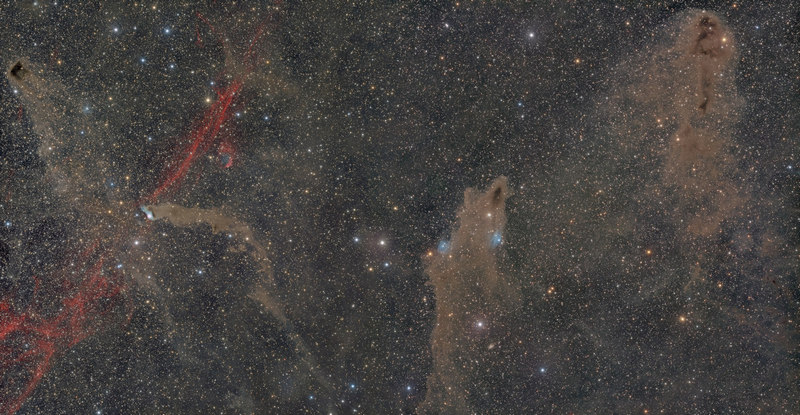 http://www.astrosurf.com/crepuscule/Per ... small2.jpg
http://www.astrosurf.com/crepuscule/Per ... small2.jpg
Name of the object: Dusty nebula in Cepheus (LBN,LDN,VDB).
Date: acquisition 2017-2020
Location: France, Alpes, Haute-Savoie at 1100m.
Setup : FSQ106 - Moravian G4 CCD (Kaf 16803) - EQ6 Pro Evolution
Autoguiding : PlaMx - Orion 80/400
Software : SkyX Pro - PixInsight - Photoshop
Sampling : 3.5 ''
Integration time : 44h10
L (141x600s = 23h30)
RVB (68x600s = 11h20)
Ha (28x1200s = 9h20)
Web site :
https://www.astrobin.com/users/Idir/
idir saci
This is a very fine widefield image of a lot of nebulas in Cepheus!

Welcome to Starship Asterisk*!
Ann
Re: Submissions: 2020 September
Posted: Sun Sep 27, 2020 5:11 am
by Ann
This is a very fine image with great colors and great background details!
Ann
Re: Submissions: 2020 September - 200 panel, 2.5 gigapixel Orion Constellation
Posted: Sun Sep 27, 2020 5:12 am
by Ann
This image has been FIVE YEARS in the making?
I'm so impressed. Thank you for your beautiful labor of love.
Ann
Re: Submissions: 2020 September
Posted: Sun Sep 27, 2020 5:18 am
by Ann
PierandreaFolle wrote: ↑Sat Sep 26, 2020 3:27 pm
Hypnotic
Startrail of 420 images of 45 seconds each, during a night spent on top of Serra di Crispo peak, in Pollino National Park.
Copyright: Pierandrea Folle
Hypnotic_apod.jpg
HQ
 Hypnotic
Hypnotic by
Pierandrea Folle, su Flickr
Your images look like color candy!
Well, I like bright colors, and I like faint colors too. I like your images. Tell me though, are your colors merely enhanced and strongly saturated, or are they randomly applied to create a veritable burst of merry-go-round rainbows upon rainbows?
Ann
Re: Submissions: 2020 September - 200 panel, 2.5 gigapixel Orion Constellation
Posted: Sun Sep 27, 2020 2:37 pm
by cosmicwreckingball
Ann wrote: ↑Sun Sep 27, 2020 5:12 am
This image has been FIVE YEARS in the making?
I'm so impressed. Thank you for your beautiful labor of love.
Ann
Thank you Ann. Yes, 5 years... It's been a LONG road. I have all of the details linked at the bottom right of the image (back to project home).
Re: Submissions: 2020 September
Posted: Sun Sep 27, 2020 4:03 pm
by Tom Zabransky
LBN468 Dark Scorpion
Equipment:
TS-Optics APO Photoline 102/714mm f/7 FPL53
TS-Optics 3" reducer 0.79x
Canon 6D modified
APM ImageMaster 60/240mm f/4
ZWO ASI120MM Mini + PHD2
EQ-6 SkyScan
Integration:
266x300s ISO800 + 147x300s ISO3200
34 hours 40 minutes
Location:
Czech Republic, Bezverov, Bortle Class 3
Processing & Imaging software:
AstroPhotography Tool, PHD2, Adobe Photoshop CC 2020, Starnet++, PixInsight 1.8
Copyright: Tomas Zabransky
Email: Blocktom@seznam.cz
Full resolution: https://www.astrobin.com/full/lxmjdf/0/
Re: Submissions: 2020 September
Posted: Sun Sep 27, 2020 11:50 pm
by barretosmed
LAGOON NEBULA (M8)
Best details
https://www.astrobin.com/full/k04f6d/0/?nc=
Equipment:
Apo ESPRIT triplet 150mm
New asi 6200mc
35 x 300 seg
Cem60 mount
July 19-20 2020
Munhoz- MG- Brazil
Processing and capture:
Software: Pixinsight , Adobe Photoshop, Sequence generation pro, PHD, Polemaster, SharpCap
Copyright: FERNANDO OLIVEIRA DE MENEZES
EMAIL:
BARRETOSMED@HOTMAIL.COM
Re: Submissions: 2020 September
Posted: Mon Sep 28, 2020 12:42 pm
by gorante
LDN 1251
https://astro.digitalcurse.com/2020/09/26/ldn-1251/
By: Marco Prelini
Down in the Cepheus molecular complex, lays this dark nebula. Its elongated shape is due to the interaction with the bubble of a supernovae explosion.
The red stains inside the darkest part of the nebulae are Herbig-Haro objects caused by new born stars forming. New worlds are going to rise there.
For who's interested in technical specs, here they are:
Shooting Data
– RGB shot, with UV/IR cut filter
– 31 600″ Light frames at -10°C / gain 120
– 31 dark/flat/darkflat frames
– ASI 294MC pro camera
– Skywatcher AZEQ6
– Skywatcher 200/1000 PDS
Frames captured on 18th of september in Febbio (Italy) under
Bortle 3 / SQM 21.6 sky
Postproduction made with PixInsight for image stacking and Photoshop/Camera raw for the color balancing and noise reduction.
HiRes on Astrobin:
https://www.astrobin.com/c3urpw/
Re: Submissions: 2020 September
Posted: Mon Sep 28, 2020 1:00 pm
by Kinch
IC 1805 - Heart Nebula
Full details and higher resolution @
https://www.kinchastro.com/ic-1805---heart-nebula.html
Re: Submissions: 2020 September
Posted: Mon Sep 28, 2020 8:24 pm
by Guest
Greetings,
Here is a fairly deep integration on the Shark Nebula and surroundings. Lots of dusty extended red emission in this area.
Telescope: Takahashi FSQ-106 EDX4
Camera: SBIG STX-16803 CCD
Location: Mayhill, New Mexico
Exposures: 19.5 hours through RGB filters, taken between 5-23 September 2020
Processing: PixInsight for 2x drizzle integration and photometric color calibration, Photoshop for final touches
Full-resolution zoomable photograph (67MP) here:
https://www.rc-astro.com/photo/id1208.html
Static large photo here:
https://www.rc-astro.com/photo/id1208_big.html
Best,
Russ
https://www.rc-astro.com
Re: Submissions: 2020 September
Posted: Tue Sep 29, 2020 3:53 pm
by Pav1007
Greetings,
i would like to show you my newest photo of dark nebulae in Cepheus. LBN552 and surrounding dust.
Here is the link to technical specification
https://www.astrobin.com/4rxyg1/?nc=user
and here is photo itself.
 http://astroscapes.eu/02_LBN552_LRGB_v5_900px.jpg
https://cdn.astrobin.com/thumbs/xVzyWlu ... XURFLk.jpg
http://astroscapes.eu/02_LBN552_LRGB_v5_900px.jpg
https://cdn.astrobin.com/thumbs/xVzyWlu ... XURFLk.jpg
i hope you will like it.
Best wishes
Pawel
Re: Submissions: 2020 September
Posted: Tue Sep 29, 2020 4:05 pm
by cappellettiariel
Hi Everyone, good morning, I want to share with you this new processed image of the Bok Globules in Running Chicken Nebula (IC 2944). Hope you enjoy it, clear skies!
11.8 h of total integration, from Córdoba, Argentina
Main equipment: ZWO ASI 1600 mm-pro + SW Explorer 200p + SW Coma Corrector 0.9x + EQ6-R-Pro + ZWO EAF + ZWO 7x2" EFW
Guide equipment: Starguider 60/240 mm F4, ZWO ASI 120mm mini
*Gain 139, -25 º C, Ha 7nm 2" Optolong, 75x180"
*Gain 139, -25 º C, Oiii-CCD 6.5 nm 2" Optolong, 80x180"
*Gain 139, -25 º C, Sii-CCD 6.5 nm 2" Optolong, 82x180"
100 Darks
100 DarkFlats
100 Flats / filter
Polar Align: SharpCap 3.2
Acquisition: SGP 3.1
Processing: Pixinsight 1.8.8, PS
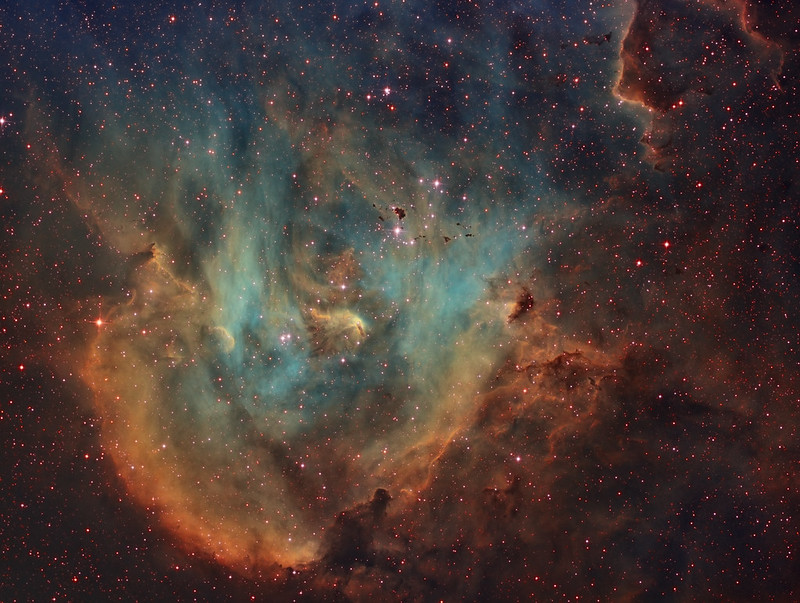
IC2944 - Bok Globules in Running Chicken Nebula (SHO) - New rendition by
Ariel Cappelletti, en Flickr
Re: Submissions: 2020 September
Posted: Tue Sep 29, 2020 7:40 pm
by Ronan Hunt
 M45
M45 by
Ronan Hunt, on Flickr
The Subaru!
I shot some exposures on M45, also known as the Pleiades/Seven Sisters/Subaru. They’re like a box of jewels in the northern sky and easily visible to the naked eye and probably the best looking star cluster visible from earth. Imagine the dusty cloud of reflection nebula next time you see them. Easily visible rising in the east after dark these days.
The dusty nebula are clouds being lit up by the star cluster as it moves through space. So it will change and move over v long tine periods. They’re really close by galactic standard at a mere 440 light years. Perhaps one day we’ll mount an expedition to visit which may be possible using nano robots travelling at neat light speed. Yes that’s a thing!
I stretched the processing quite far to try and highlight the surrounding dark dust but it’s extremely faint. I suspect adding more exposure will help bring them out.
This is just under 4 hours of LRGB taken over 2 nights. It’s a mix of 3 and 1 minute exposures.
Luminance- 50 minutes
Red - 62 minutes
Green - 60 minutes
Blue - 67 minutes
Gear
Sky Watcher Star Adventurer
Skywatcher Stainless Tripod
ZWO ASI 183mm Pro
Antlia LRGB filters
ZWO Electronic Filter Wheel
William optics Redcat 51
ZWO mini Guidescope and ADI 120mm mini guide camera
Controlled by ASIair.
Processed in APP and Pixinsight. With touches in Lightroom.
Re: Submissions: 2020 September
Posted: Tue Sep 29, 2020 8:29 pm
by Ilpool187
The velo nebula
The photo is a six frames mosaic using a 1850mm telescope, a big effort made from July to September 2020.
It is more than 52 hours in bicolor alpha and O3 using the multiblend technique.
Setup:
- CCD G24000-Astrodon Filter Ha O3
Processed using Pixinsight/Photoshop
Authors: Paolo Zampolini e Giorgio Mazzacurati @3zObservatory
For the full image:
https://www.3zobservatory.com/immagini/ ... ulosa-velo
Re: Submissions: 2020 September
Posted: Wed Sep 30, 2020 5:33 am
by Ann
barretosmed wrote: ↑Sun Sep 27, 2020 11:50 pm
LAGOON NEBULA (M8)
Best details
https://www.astrobin.com/full/k04f6d/0/?nc=
Equipment:
Apo ESPRIT triplet 150mm
New asi 6200mc
35 x 300 seg
Cem60 mount
July 19-20 2020
Munhoz- MG- Brazil
Processing and capture:
Software: Pixinsight , Adobe Photoshop, Sequence generation pro, PHD, Polemaster, SharpCap
Copyright: FERNANDO OLIVEIRA DE MENEZES
EMAIL:
BARRETOSMED@HOTMAIL.COM
Thank you! I really appreciate the fact that you have brought out the faint blue reflection nebulosity surrounding parts of the Lagoon Nebula. And then there is the reddish "tail" that connects the Lagoon Nebula with the NGC 6559 complex (
here seen in a picture by Bryan C).
Thanks again!
Ann
Re: Submissions: 2020 September
Posted: Wed Sep 30, 2020 5:37 am
by Ann
Ronan Hunt wrote: ↑Tue Sep 29, 2020 7:40 pm
 M45
M45 by
Ronan Hunt, on Flickr
The Subaru!
I shot some exposures on M45, also known as the Pleiades/Seven Sisters/Subaru. They’re like a box of jewels in the northern sky and easily visible to the naked eye and probably the best looking star cluster visible from earth. Imagine the dusty cloud of reflection nebula next time you see them. Easily visible rising in the east after dark these days.
The dusty nebula are clouds being lit up by the star cluster as it moves through space. So it will change and move over v long tine periods. They’re really close by galactic standard at a mere 440 light years. Perhaps one day we’ll mount an expedition to visit which may be possible using nano robots travelling at neat light speed. Yes that’s a thing!
I stretched the processing quite far to try and highlight the surrounding dark dust but it’s extremely faint. I suspect adding more exposure will help bring them out.
This is just under 4 hours of LRGB taken over 2 nights. It’s a mix of 3 and 1 minute exposures.
Luminance- 50 minutes
Red - 62 minutes
Green - 60 minutes
Blue - 67 minutes
Gear
Sky Watcher Star Adventurer
Skywatcher Stainless Tripod
ZWO ASI 183mm Pro
Antlia LRGB filters
ZWO Electronic Filter Wheel
William optics Redcat 51
ZWO mini Guidescope and ADI 120mm mini guide camera
Controlled by ASIair.
Processed in APP and Pixinsight. With touches in Lightroom.
Hi Ronan, I guess you're new here! Welcome and thanks for your contribution! I'm always happy to see a new (RGB) picture of my favorite cluster, the Pleiades!

Ann
Re: Submissions: 2020 September
Posted: Wed Sep 30, 2020 1:01 pm
by barretosmed
The Tarantula Nebula ( NGC 2070) in Duo-Band
Best details
https://www.astrobin.com/full/t84mgg/B/?nc=user
Equipment:
Apo ESPRIT triplet 150mm
ZWO Duo Band
New asi 6200mc
37 x 300 seg
Cem60 mount
July 19-21, 2020
Munhoz- MG- Brazil
Processing and capture:
Software: Pixinsight , Adobe Photoshop, Sequence generation pro, PHD, Polemaster, SharpCap
Copyright: Fernando Oliveira de Menezes
Email:
Barretosmed@hotmail.com








